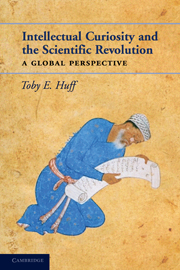Book contents
-
Frontmatter
-
Contents
-
Illustrations
-
Preface
-
Acknowledgments
- Part I
Something New under the Sun
- Part II
Patterns of Education
- Part III
Science Unbound
- 7
Infectious Curiosity I
- 8
Infectious Curiosity II
- 9
Infectious Curiosity III
- 10
Prelude to the Grand Synthesis
- 11
The Path to the Grand Synthesis
- 12
The Scientific Revolution in Comparative Perspective
- Epilogue
Science, Literacy, and Economic Development
-
Selected References
-
Index
- References
10 - Prelude to the Grand Synthesis
Published online by Cambridge University Press: 05 June 2012
- Frontmatter
- Contents
- Illustrations
- Preface
- Acknowledgments
- Part I Something New under the Sun
- Part II Patterns of Education
- Part III Science Unbound
- 7 Infectious Curiosity I
- 8 Infectious Curiosity II
- 9 Infectious Curiosity III
- 10 Prelude to the Grand Synthesis
- 11 The Path to the Grand Synthesis
- 12 The Scientific Revolution in Comparative Perspective
- Epilogue Science, Literacy, and Economic Development
- Selected References
- Index
- References
Summary
Before we look at the new synthesis of astronomy, the science of mechanics, and other forces, we should recall the scientific context outside Europe, especially in the Muslim world, regarding astronomy and the science of motion.
Earlier, in Chapter 5, I outlined developments in optics, astronomy, and the science of motion in the Muslim world up to the end of the seventeenth century. We saw that when the telescope arrived in Mughal India (1615), in the Ottoman Empire (ca. 1630), and the broader Middle East, there was no response triggering an upsurge in astronomical activity. No new telescopes were designed, no new observatories were built, and no new astronomical observations were compiled using the telescope.
- Type
- Chapter
- Information
-
Intellectual Curiosity and the Scientific RevolutionA Global Perspective, pp. 253 - 266Publisher: Cambridge University PressPrint publication year: 2010



